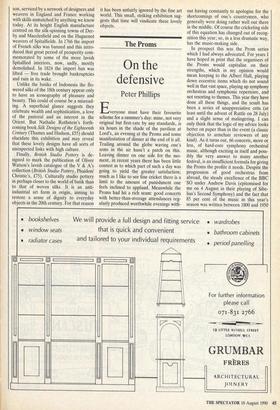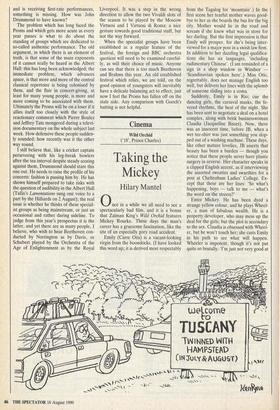The Proms
On the defensive
Peter Phillips
Everyone must have their favourite scheme for a summer's day: mine, not very original but first-rate by any standards, is six hours in the shade of the pavilion at Lord's, an evening at the Proms and some manifestation of dinner at the end of it all. Trailing around the globe waving one's arms in the air hasn't a patch on this. Leaving dinner on one side for the mo- ment, in recent years there has been little contest as to which part of such a day was going to yield the greater satisfaction; much as I like to see fine cricket there is a limit to the amount of punishment one feels inclined to applaud. Meanwhile the Proms had hit a rich seam: good concerts with better-than-average attendances reg- ularly produced worthwhile evenings with- out having constantly to apologise for the shortcomings of one's countrymen, who generally were doing rather well out there in the middle. Of course the cricketing side of this equation has changed out of recog- nition this year; so, in a less dramatic way, has the music-making side.
In prospect this was the Prom series which I had always advocated. For years I have hoped in print that the organisers of the Proms would capitalise on their strengths, which in my opinion would mean keeping to the Albert Hall, playing down eccentric items which do not sound well in that vast space, playing up symphony orchestras and symphonic repertoire, and not resorting to themes. This year they have done all these things, and the result has been a series of unappreciative crits (at least until the advent of Rattle on 28 July) and a slight sense of malingering. I can only think that the logic of my advice looks better on paper than in the event (a classic objection to armchair reviewers of any kind). As it turns out, 66 concerts, more or less, of hard-core symphony orchestral music, although exciting in itself and poss- ibly the very answer to many another festival, is an insufficient formula for giving the Proms the profile it needs. Despite the progression of good orchestras from abroad, the steady excellence of the BBC 'SO under Andrew Davis (epitomised for me on 4 August in their playing of Sibe- lius's Second Symphony) and the fact that 85 per cent of the music in this year's season was written between 1800 and 1950 and is receiving first-rate performances, something is missing. How was John Drummond to have known?
The problem which has long faced the Proms and which gets more acute as every year passes is what to do about the standing of groups which are dedicated to so-called authentic performance. The old argument, in which there is an element of truth, is that some of the main exponents of it cannot really be heard in the Albert Hall: this has long been acknowledged; the immediate problem, which advances apace, is that more and more of the central classical repertoire is being colonised by them, and the flair in concert-giving, at least for many young people, is more and more coming to be associated with them. Ultimately the Proms will be on a loser if it allies itself too closely with the style of reactionary comment which Pierre Boulez and Jeffrey Tate mongered during a televi- sion documentary on the whole subject last week. How defensive these people sudden- ly sounded; how recently was it the other way round.
I still believe that, like a cricket captain persevering with his leg-break bowlers after the tea interval despite steady scoring against them, Drummond should stare this one out. He needs to raise the profile of his concerts: fashion is passing him by. He has shown himself prepared to take risks with the question of audibility in the Albert Hall (Tallis's Lamentations sung one voice to a part by the Hilliards on 2 August); the real issue is whether he thinks of these special- ist groups as being mainstream, or just an occasional and rather daring sideline. To judge from this year's prospectus it is the latter, and yet there are as many people, I believe, who wish to hear Beethoven con- ducted by Norrington as by Davis, or Schubert played by the Orchestra of the Age of Enlightenment as by the Royal
Liverpool. It was a step in the wrong direction to allow the two Vivaldi slots of the season to be played by the Moscow Virtuosi and I Virtuosi di Roma: a nice gesture towards good traditional stuff, but not the way forward.
When the specialist groups have been established as a regular feature of the festival, the foreign and BBC orchestra quotient will need to be examined careful- ly, as will their choice of music. Anyone can see that there is too much Beethoven and Brahms this year. An old established festival which relies, we are told, on the good opinion of youngsters will inevitably have a delicate balancing act to effect; just now I feel the Proms has fallen off on the stale side. Any comparison with Gooch's batting is not helpful.



























































 Previous page
Previous page